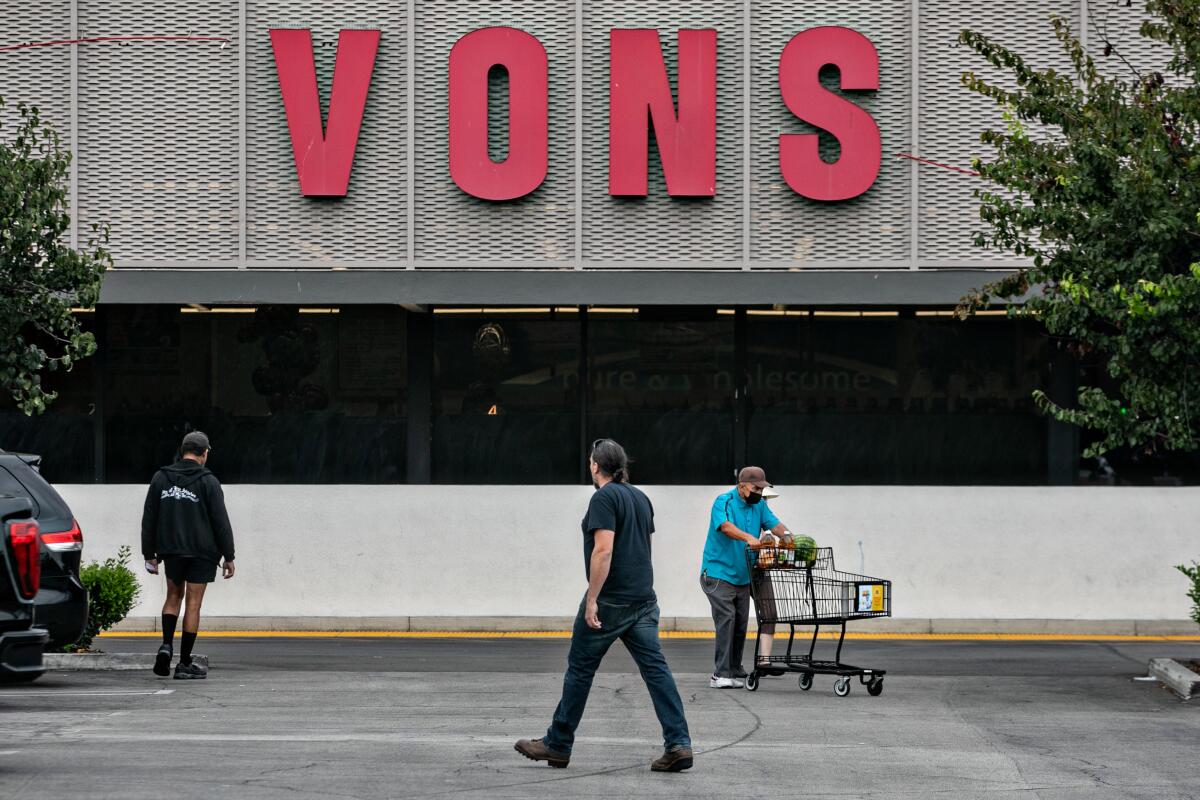$25-billion Kroger-Albertsons merger plan is blocked by federal judge

- Share via
Kroger’s plans to buy its grocery rival Albertsons hit a major roadblock Tuesday, when a federal judge put a halt to the deal, which would be the largest supermarket merger in U.S. history.
The decision is a blow to Albertsons and Kroger, which announced plans for the $24.6-billion acquisition of its rival in 2022.
The Federal Trade Commission, California and several other states had sued to stop the deal, arguing the merger would decimate competition in many parts of the country and leave customers at the mercy of a newly formed behemoth that could drive up prices.
“This historic win protects millions of Americans across the country from higher prices for essential groceries—from milk, to bread, to eggs—ultimately allowing consumers to keep more money in their pockets,” said Henry Liu, the FTC’s Bureau of Competition director, in a statement.
The decision by U.S. District Judge Adrienne Nelson in Oregon to issue a preliminary injunction in the case means the two companies cannot proceed with their merger and will have to make their case again before the Federal Trade Commission, which will conduct an in-house proceeding on the proposed deal before an administrative law judge.
“Any harms defendants experience as a result of the injunction do not overcome the strong public interest in the enforcement of antitrust law,” Nelson wrote in her 71-page decision.
Representatives of Kroger and Albertsons said they’re reviewing their options and are “disappointed” by the ruling. A spokesperson for Kroger added that the merger “is in the best interests of customers, associates, and the broader competitive environment in a rapidly evolving grocery landscape.”
The ruling comes after a three-week hearing that started in late August in a federal courtroom in Oregon and featured the grocery store chains’ executives, FTC lawyers, union leaders and antitrust experts. The high-stakes court battle centered on concerns that the mega-merger would add to the financial woes of consumers who have grappled with the rising cost of food.
Depending who you ask, a Kroger-Albertsons merger will drive prices up or down. So, which is it?
The case garnered particular attention as it touched on hot-button issues of rising food prices and labor rights during a tight U.S. presidential race in which Donald Trump hammered Vice President Kamala Harris on people’s dissatisfaction with the economy.
In October, Albertsons agreed to pay nearly $4 million to settle a civil law enforcement complaint that alleged the company overcharged customers for groceries and lied about the weight of some products.
Kroger and Albertsons executives have defended their decision to merge, saying in court that joining forces would help them compete with big retailers such as Walmart, Costco and Amazon. Kroger Chief Executive Rodney McMullen told the courtroom that the grocery chains planned to lower grocery prices after the merger. The supermarket chains say they’ve kept their gross profit margins low as part of their efforts to lower prices and will reduce the disparity between the grocery prices at Kroger and Albertsons.
The judge, though, said in her ruling that courts should be skeptical of promises that can’t be enforced, noting that “business realities” might force the grocery chains to alter whether they follow through on their vows to lower prices.
The federal government also made the case that supermarkets are different than other retailers because people go to these stores to buy groceries in a single visit. Costco, for example, requires membership, has bulk packages and lacks services offered in grocery chains like Kroger and Albertsons.
“It is not surprising that consumers spend money at a variety of different types of retailers, but this does not necessarily show that those retailers are reasonably interchangeable substitutes for a consumer’s particular needs,” the judge wrote.
To address concerns that reduced competition would lead to higher grocery store prices, Kroger and Albertsons have proposed selling 579 stores to another company, C&S Wholesale Grocers. That includes 63 stores in California, mainly in Southern California. After hearing testimony from experts, however, the judge wasn’t swayed.
U.S. regulators argued that the merger would hurt consumers. In its lawsuit filed in February, the FTC alleged that a lack of competition would lead to higher grocery prices, reduce food quality and customer service and harm grocery workers who are pushing for better working conditions and wages. Because Kroger and Albertsons are rivals, they compete with one another for workers and will price-match competitors.
Nelson said it was “plausible” that the merger would reduce competition for union grocery store labor, but noted there’s “no economic modeling of how wages, benefits, and other compensation might change as a result of changes in bargaining power.”
Acquisitions have fueled Kroger’s and Albertsons’ growth. Albertsons owns the well-known brands Pavilions, Safeway and Vons. Kroger operates Ralphs, Food4Less, Fred Meyer, Fry’s, Quality Food Centers and other popular grocery stores. If the merger ultimately goes through, the two supermarket chains would operate more than 5,000 stores in 48 states, the FTC said in the lawsuit.
The competition among grocery stores has been intensifying. Nationwide, Walmart is the most popular retailer, according to consumer data company Numerator. On the West Coast, Costco is the most popular retailer, followed by Walmart, Albertsons, Kroger, Amazon and Target.
Whether shoppers would see their grocery prices rise or fall was a complicated question for the court because a variety of forces can affect food prices. Those factors include competition, the costs of ingredients, worker wages, management efficiency and disease outbreaks.
Some experts say the effect the merger would have on grocery prices could depend on where a shopper lives. Some grocery mergers in major cities with a lot of competition such as San Francisco and New York have led to lower prices. In cities with less competition such as Topeka, Kan., grocery store mergers have resulted in higher prices. Economists have also found that sometimes a merger results in relatively little change in prices.
Siding with economic analysis provided by the federal government’s expert, Nelson noted the proposed merger is “presumptively unlawful.”
“Plaintiff’s analysis is persuasive and shows that the loss of head-to-head competition will incentivize price increases in many markets,” she wrote.
More to Read
Inside the business of entertainment
The Wide Shot brings you news, analysis and insights on everything from streaming wars to production — and what it all means for the future.
You may occasionally receive promotional content from the Los Angeles Times.












